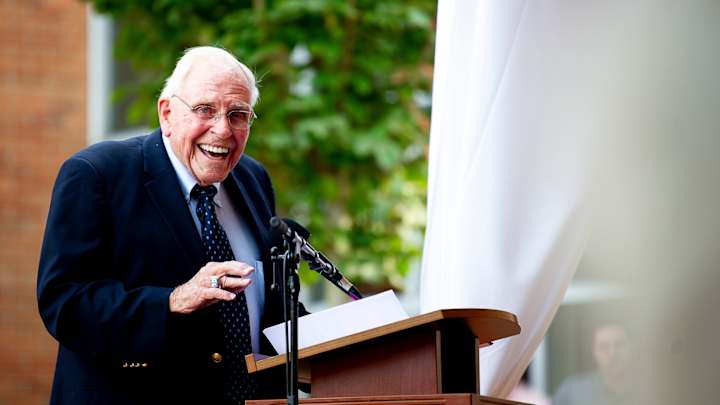The SEC Is On The Right Track. Says Who? Says Roy Kramer

On Tuesday two of the Power Five conferences (Big Ten, Pac-12) announced they had pulled the plug on the 2020 college football season out of concerns about the COVID-19 virus.
The three other big conferences (ACC, SEC, Big 12) said that they will continue to prepare to play the 2020 college football season.
And given the landscape of the media and social media, it is pretty good bet that moving forward the commissioners of those three conferences—Greg Sankey (SEC), John Swofford (ACC) and Bob Bowlsby (Big 12) will have their motives—and their wisdom—questioned on a daily basis.
It just comes with the territory of being a commissioner.
Says Who?
Says Roy Kramer, the former commissioner of the SEC (1990-2002) and one of the foremost minds in the history of college athletics.
Kramer, still very sharp at 90 years young, has been watching the events unfold from his home in the East Tennessee town of Vonore (population 1,474). His assessment of the three commissioners who decided to keep moving toward the 2020 season?
“I think when you sit in that chair you have to make the calls as you see them,” said Kramer, who created divisional play and the SEC championship game in 1992. “You can’t look across the country and see what somebody else is doing. You have to do what is good for your group of people. It has to be an independent decision because of the health factor involved. That makes this different than anything we’ve faced before.”
Kramer says he last talked to Sankey about a week ago and that the two communicate on a regular basis. Kramer gave high marks for the way Sankey has handled the crisis.
“The main thing is that the SEC has decided to take its time,” said Kramer. “There is no need to rush. A situation like this is going to constantly change. There will come a time when you have to make a decision. But you don’t have to make a decision today.”
Kramer knows all too well what it is like to be a commissioner under pressure.
When he created the SEC championship game there were critics—some were his own coaches-- who said that the conference would never win another national championship. In the first game at Legion Field in Birmingham Alabama needed a late pick-six by Antonio Langham to beat Florida 28-21. Had Alabama lost the Crimson Tide would have been knocked out of a shot at the national championship, which it eventually won by beating Miami in the Sugar Bowl.
Kramer caught a lot of heat in September of 2001 when the SEC announced that it would play on the Saturday after the terrorist attacks in the United States. Kramer had received guidance from the White House that it would be a public service for the SEC to play.
“We felt strongly that we needed to mourn the loss of life,” said Kramer. “The thing that the terrorists wanted to do was disrupt our lives. We wanted to make a statement to the world.”
But when the NFL, which had earlier indicated that it was going to play, decided it would not play the SEC ultimately chose to step aside. The SEC eventually returned to play for a game between South Carolina and Mississippi State in Starville Thursday, Sept. 20.
“There were people pointing fingers but it’s just the world that we live in,” he said. “You are going to get criticized no matter what decision you make. So go ahead and make it for the right reasons.”
And what has been his advice to Sankey?
“Understand there is going to be no shortage of advice. You’ll get all you need,” Kramer said he told Sankey. “Just turn that off and do what’s best for the conference.”
Kramer, who was succeeded by Mike Slive as commissioner (2002-2015), says he’s confident the SEC is on the right track with this decision.
“The stance the SEC is taking is a good one, a sound one, and a measured one,” Kramer said. “I don’t know why other conferences had to rush into this situation.”
